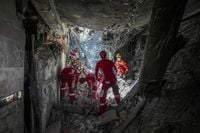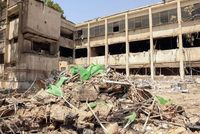On June 23, 2025, as the world watched the escalating conflict between Israel and Iran, a powerful Israeli airstrike shattered the walls of Evin Prison in Tehran—a facility infamous for holding political activists and dissidents. The attack, which occurred during visiting hours, left at least 80 people dead, according to official Iranian statements, and has since drawn international condemnation and calls for accountability.
Evin Prison, a sprawling 43-hectare complex in northern Tehran, has long been associated with Iran’s harsh repression of political dissent. At the time of the strike, it housed more than 1,500 prisoners, many of them activists and critics of the Iranian regime, according to Human Rights Watch (HRW). But on that fateful day, the prison was not just a symbol of political struggle—it became the epicenter of a humanitarian catastrophe.
According to HRW’s detailed investigation, the Israeli strikes hit multiple buildings within the prison compound between 11:17 a.m. and 12:18 p.m. The attacks destroyed the main southern entrance, another northern entrance, the visitors’ information building, the visitation hall, a judicial complex, the medical clinic, and several prison wards. The timing, during visiting hours, meant that not only inmates but also their families, staff, and even neighborhood residents were caught in the devastation. The Associated Press reported that among the dead were prisoners, visiting relatives, and prison staff, while domestic Iranian media later raised the death toll to 80.
Eyewitness accounts and survivor testimonies paint a harrowing picture. Two political prisoners, Abolfazl Ghadiani and Mehdi Mahmoudian, described the "sounds of repeated explosions" near their ward, the sight of the medical clinic burning, and the grim task of helping to extricate 15 to 20 bodies from the rubble. Dr. Saeedeh Makarem, a volunteer at the clinic, recounted being rescued by prisoners from the debris and later undergoing major surgery, including hand replantation. The attack also claimed the lives of several civilians outside the prison, including 61-year-old artist Mehrangiz Imenpour and 69-year-old businessman Ali Asghar Pazouki, as reported by HRW.
In the immediate aftermath, Iranian authorities evacuated the surviving prisoners, transferring them to two other facilities in Tehran province. State media insisted that the transfers were conducted peacefully and without conflict, but HRW and relatives of prisoners allege a different reality. According to their reports, some political prisoners were beaten with batons and "electric shock weapons" for resisting handcuffs and protesting the separation of death-row inmates. The group further claims that some prisoners, including Swedish-Iranian doctor Ahmadreza Djalali—who is reportedly at risk of execution—have disappeared, with authorities refusing to provide any information about their whereabouts.
The Israeli military confirmed the strike several hours after it occurred, but offered little in the way of justification. Defense Minister Israel Katz stated that Evin Prison had been targeted for its role as an "agency of government repression," while Foreign Affairs Minister Gideon Sa’ar framed the attack as retaliation for Iran’s missile strikes on Israel. An Israeli military spokesperson alleged, without providing evidence, that Iran conducted "intelligence operations" against Israel from within the prison. However, HRW’s investigation found no evidence of military personnel, arms, or material inside Evin at the time of the attack. None of the 22 sources interviewed—including former prisoners, relatives, and lawyers—reported seeing any Iranian military presence within the compound.
Under international humanitarian law, prisons are considered civilian objects and are protected from attack unless they are being used for military purposes. Human Rights Watch concluded that the Israeli strike was "unlawfully indiscriminate" and an "apparent war crime," citing the lack of any evident military target and the absence of advance warning. "Israel’s strikes on Evin prison on June 23 killed and injured scores of civilians without any evident military target in violation of the laws of war and is an apparent war crime," said Michael Page, HRW’s deputy Middle East director. "The Israeli attack placed at grave risk the already precarious lives of Evin’s prisoners, many of them wrongfully detained dissidents and activists."
The attack’s repercussions extended beyond the immediate loss of life. HRW and other human rights organizations have raised alarms about enforced disappearances, particularly among prisoners held in sections of the prison known for housing those accused of national security offenses. The whereabouts and condition of many detainees remain unknown, exacerbating the anguish of their families. "Iranian authorities should not use Israel’s strikes on Evin prison as another opportunity to subject prisoners, including those who should never have been in prison in the first place, to ill-treatment," Page emphasized.
HRW’s investigation, which included satellite imagery analysis, interviews, and review of videos and photographs, also noted the use of multiple types and sizes of munitions in the attack. Evidence of delayed-action fuzes and undetonated missiles was reported by Iranian police, though no detailed information was released. The damage was extensive, with several buildings partially or totally destroyed, including administrative offices, social workers’ quarters, and the quarantine section where transgender prisoners were held.
The Evin Prison strike was part of a broader 12-day war between Israel and Iran from June 13 to 25, 2025. The conflict began with Israeli attacks on Iranian nuclear and military facilities, prompting Iran to launch ballistic missile and drone attacks on Israeli cities and infrastructure. According to Iranian health officials, the war killed about 1,100 people in Iran, including 700 civilians, and injured 5,800. In Israel, the Foreign Affairs Ministry reported 30 civilian deaths, including four children, and more than 3,300 injuries from Iranian strikes.
Despite the magnitude of the tragedy at Evin, both Israeli and Iranian authorities have been criticized for their lack of transparency and accountability. HRW wrote to both governments seeking information but received no responses. The group has called for full investigations into violations of the laws of war by both sides and for those responsible for war crimes to be held accountable. Yet, as HRW notes, both countries have longstanding records of impunity when it comes to investigating their own conduct in conflict.
The devastation at Evin Prison stands as a grim testament to the human cost of modern warfare and the dangers of unchecked power. As families mourn their loved ones and survivors struggle to recover, the world is left to grapple with the consequences of a strike that, according to Human Rights Watch, should never have happened.






